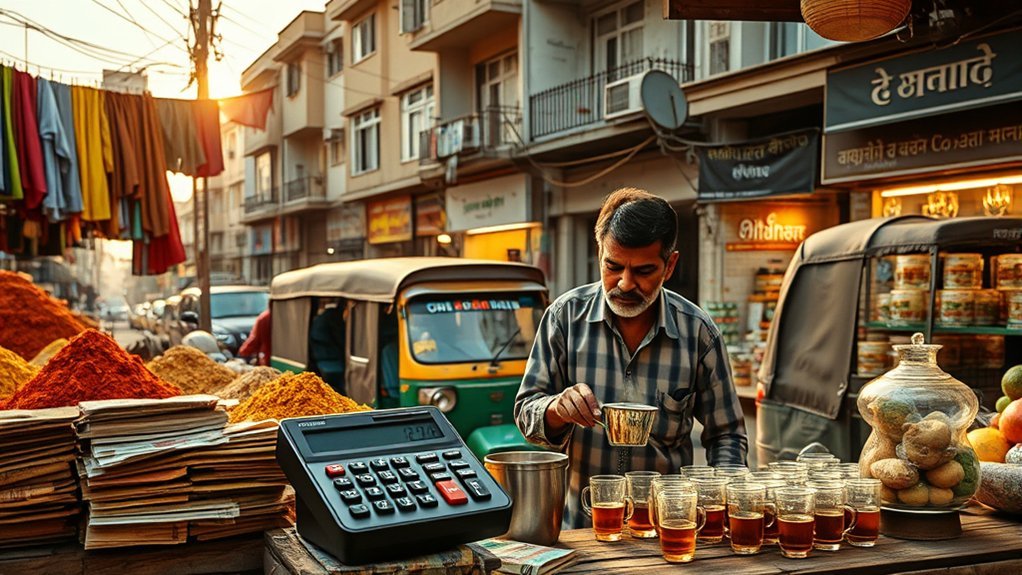You’ll find living in Pakistan is much cheaper than Western cities: basic monthly costs for a single person run about $332–$355, with one‑bed downtown rent near $102 and utilities around $66. High‑speed internet is roughly $14, public transport fares under $0.25 per trip, and groceries and dining are markedly lower than in the U.S. or U.K. Healthcare and visa costs vary, so plan budgets and insurance accordingly — keep going to get neighborhood, banking, and visa specifics.
Life in Pakistan: Culture, Cities, and Daily Living
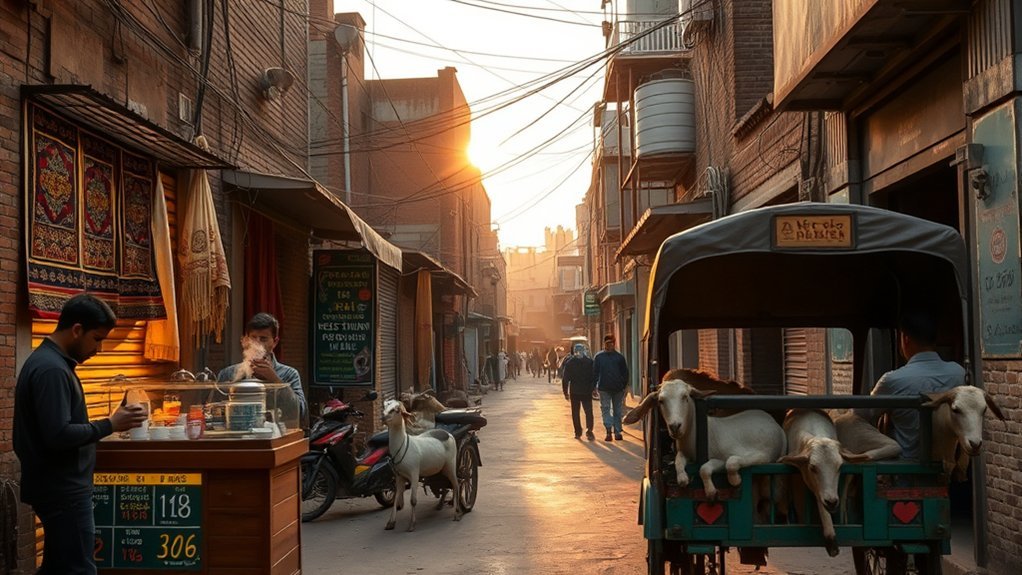
Although you’ll find a rich tapestry of traditions and warm hospitality across Pakistan, the practical appeal for many is the low cost of living: major cities like Islamabad, Lahore, and Karachi typically keep monthly living expenses (excluding rent) around $332–$355 for a single person, with rent in Islamabad roughly 93% cheaper than London and Lahore/Karachi about 95% cheaper.
Despite rich traditions and warm hospitality, many are drawn to Pakistan by its low, predictable living costs.
In life in Pakistan, you’ll notice daily costs are concrete: milk ~ $0.78/L and chicken breast ~ $2.99/kg, making groceries predictable and affordable.
Cities differ: Islamabad is planned and pricier for services, Lahore balances culture and cost, Karachi offers scale economies.
Urdu serves as the national lingua franca while Punjabi dominates regionally, so you’ll navigate multilingual interactions easily.
Social life centers on family, food, and markets; hospitality reduces informal expenses like shared meals.
For a pragmatic mover, these comparative data points let you model monthly budgets and prioritize neighborhoods, transport, and lifestyle choices without guessing on everyday outlays.
Cost Breakdown: Housing, Utilities, and Transportation
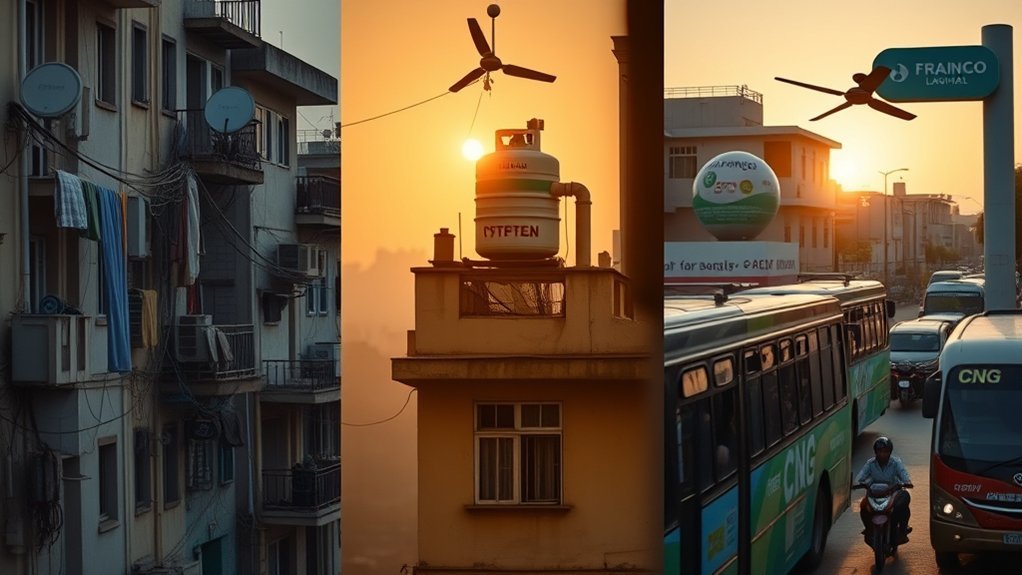
You’ll find rent for a one-bedroom downtown apartment in Pakistan averages about $102, a fraction of the U.S. $1,659, so housing will likely be your biggest saving.
Utilities and monthly bills — roughly $66.40 for basic services and $14.40 for high-speed internet — are also substantially cheaper than U.S. equivalents, which helps predict monthly budgets more accurately.
Use these comparative figures to estimate your overall monthly cost and decide which neighborhoods and service levels fit your needs.
Rent and Housing Costs
One clear advantage of living in Pakistan is the lower housing and everyday living costs: a downtown one‑bedroom runs about $102 versus $1,659 in the U.S. You’ll find rent and housing costs are a major driver of the average cost of living gap. Lower rents make urban living and savings more feasible, though mortgage rates are higher, so buying can be expensive long-term.
| Category | Pakistan vs U.S. |
|---|---|
| Downtown 1‑bedroom rent | $102 vs $1,659 |
| Mortgage (20‑yr) | 17.64% vs 6.41% |
| Local transport ticket | $0.22 vs $2.35 |
Use renting for flexibility; plan buying only if you can absorb high interest.
Utilities and Monthly Bills
If you’re weighing monthly living costs, utilities and transport in Pakistan are decisively cheaper than in the U.S., with a downtown one‑bedroom at about $102 versus $1,659, average utility bills around $66.40 versus $125, and high‑speed internet near $14.40 compared with $67.50 — savings that make urban living and commuting far more affordable; a single local transport ticket is $0.22 (vs. $2.35) and a monthly pass about $7.28 (vs. $69.50), so regular commuters see the biggest relative gains.
- Utilities: expect about $66.40 monthly bills for electricity, water and gas; outages can raise generator or fuel costs.
- Internet: 50+ Mbps runs near $14.40 — fast and cheap for streaming and remote work.
- Transport: pay $0.22 per trip or $7.28 monthly and cut commuting expenses dramatically.
Food and Groceries: Typical Prices and Dining Out
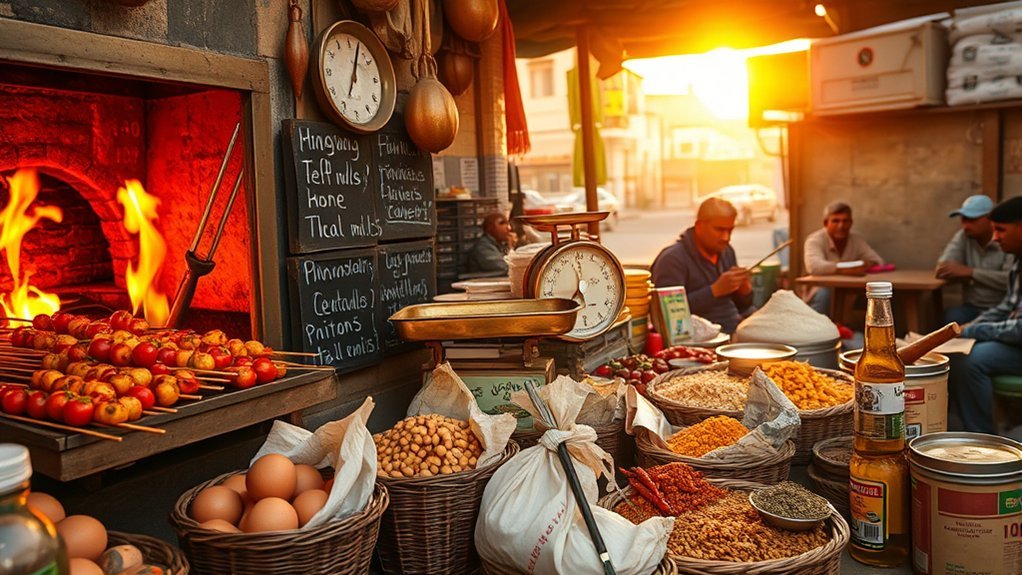
Compared with U.S. prices, everyday eating in Pakistan is markedly cheaper: a typical lunch runs about $19.50 versus $76.50 in the U.S., dinner for two at a mid-range restaurant is roughly $13.20 compared with $76.50, and a fast-food meal costs about $4.42 rather than $11.50.
You’ll find food and groceries—both dining out and buying staples—offer substantial savings. A cappuccino is about $1.89 (vs. $5.34), and domestic non-alcoholic beer in a pub is near $2.35 (vs. $6.31).
Practically, that means you can eat out frequently or stretch a modest grocery budget further without sacrificing variety. If you cook, local markets and supermarkets keep common items affordable; if you prefer restaurants, mid-range meals and coffee are low-cost.
Use the comparative figures to plan a monthly food budget: eating out regularly will still cost a fraction of U.S. levels, and combining occasional dining with grocery shopping gives the best cost-to-convenience balance.
Healthcare, Insurance, and Safety for Expats
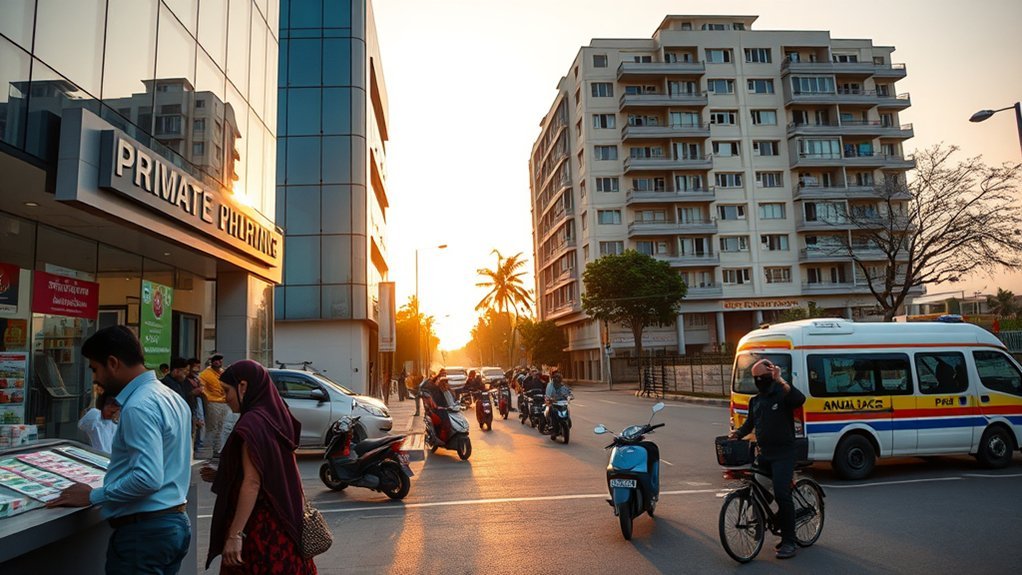
While major cities like Islamabad, Lahore, and Karachi offer reputable hospitals and specialists, healthcare quality and access can vary widely elsewhere in Pakistan, so you should plan accordingly.
You’ll find solid private hospitals and specialists in those cities, but rural areas may lack advanced diagnostics and specialist care. International health insurance is highly advisable to guarantee treatment standards and cover emergency evacuations to nearby countries with better tertiary care.
- Carry international healthcare insurance: covers hospital bills, specialist referrals, and medevac when local services fall short.
- Research local facilities before relocating: compare hospital accreditation, specialist availability, and patient reviews in your city.
- Build a local safety network: connect with expat communities and trusted locals, avoid political demonstrations, and follow security guidance.
Crime and violence have declined markedly since 2012 in major urban centers, yet you should remain cautious, register with your embassy, and prioritize insurance that reflects the limits of local healthcare.
Working, Visas, and Banking Essentials
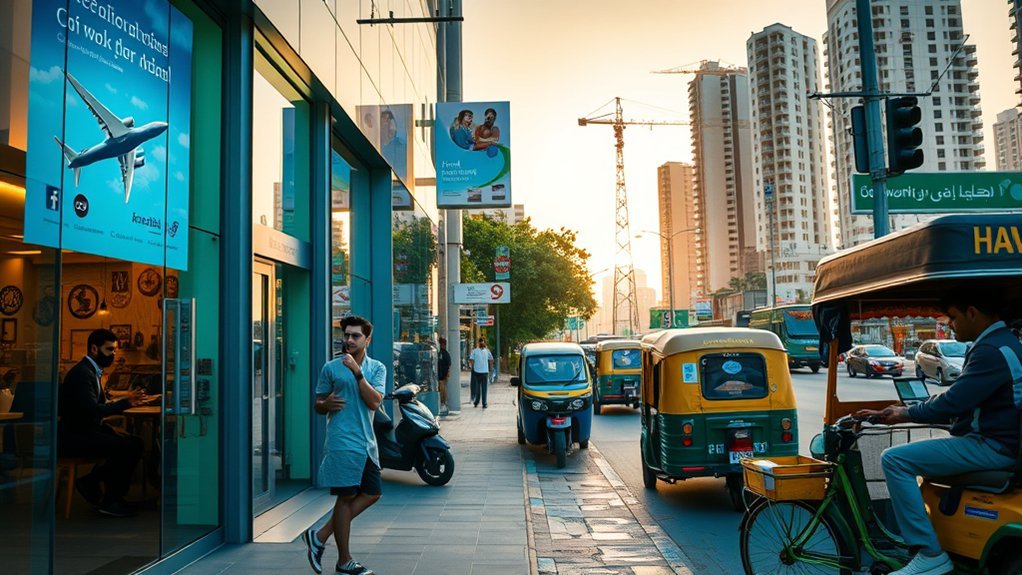
To work in Pakistan you’ll need a work visa tied to a local job offer and supporting documents, and processing times and requirements vary by embassy and employer.
Expect bank account approvals to take about 7–15 days after you submit passport, visa, proof of residence and a modest minimum deposit (roughly PKR 5,000–50,000).
Compared with Western cities—rents can be 93–95% lower than London—these practical visa and banking steps make relocation financially appealing if you secure employment in Karachi, Lahore, or Islamabad.
Work Permit Requirements
Wondering what you need to legally work in Pakistan? Living in Pakistan as an expat means meeting clear work permit requirements: you’ll need a job offer, Ministry of Interior approval, and an appropriate work visa.
Compare sectors—some industries cap foreign hires—before accepting offers. You’ll also need a National Tax Number (NTN) from the Federal Board of Revenue to pay taxes.
- Get a sponsor job offer and Ministry approval; permits usually last one year and are renewable.
- Obtain an NTN for legal employment and taxation; registration is straightforward but mandatory.
- Research sector-specific quotas and secure international health insurance for reliable healthcare access.
This practical, data-driven approach keeps you compliant and ready to work in Pakistan.
Visa Application Process
Because you’ll need a Pakistani employer to sponsor you, start the visa application as soon as you have a job offer—processing often takes several weeks and typically results in a one-year work visa that can be extended with a renewed contract and regulatory compliance.
For the visa application process, you’ll submit a valid passport, completed forms, educational certificates and a police clearance; timelines average 4–8 weeks depending on documentation completeness.
Comparatively, Pakistan’s one-year standard is shorter than multi-year permits in some regional peers, so plan renewals early. You should also apply for a residency permit if you intend to stay longer.
Keep organized records of employment and residency paperwork to speed renewals, compliance checks and any interactions with local authorities.
Opening Local Bankaccounts
If you’ll be working in Pakistan you’ll need a local bank account for salary deposits, bill payments and everyday transactions, and the process is fairly standardized: schedule an appointment, bring your passport, visa, proof of residence, ID and proof of income, and expect a minimum opening deposit of roughly PKR 5,000–50,000 (≈US$18–180) depending on the bank.
You’ll typically wait 7–15 days for application review and card issuance.
Compare account types — savings, current, foreign currency — and monthly fees to match your needs.
Practical steps:
- Verify required documents and book an appointment.
- Compare minimums, per month maintenance fees and ATM networks.
- Choose account type (savings/current/FCY) based on salary currency and transfer needs.
Moving Tips: Budgeting, Neighborhoods, and Practical Advice
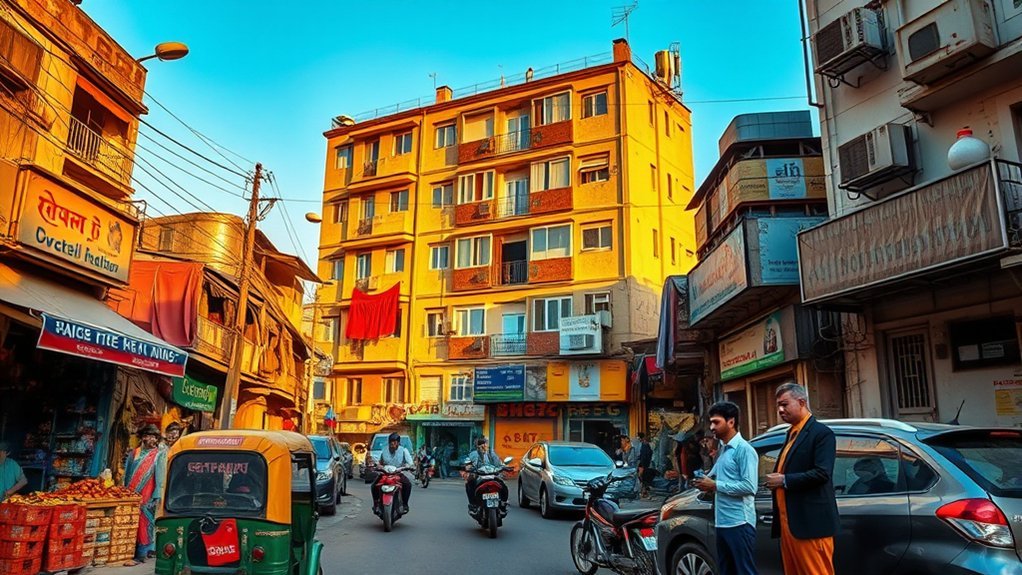
When you budget for a move to Pakistan, use city-specific figures: a single person in Islamabad can expect about US$355/month for living costs excluding rent, while rents in Karachi and Lahore are often far cheaper—up to 95% lower than London.
So compare neighborhood options like DHA and Gulberg against your rent expectations and lifestyle. Treat Pakistan comparatively: it ranks among best countries to live for low housing costs, but your choices change expenses.
Allocate at least 20% of income to savings to buffer rent spikes or currency shifts. Open a local bank account with PKR 5,000–50,000 as the minimum deposit and bring passport plus proof of income.
Prioritize neighborhoods near good hospitals in Islamabad, Lahore, or Karachi if healthcare access matters; otherwise suburban options cut rent. Buy international health insurance before arrival.
Practical checklist: research rents by neighborhood, set a 20% savings target, confirm banking documents, and secure insurance—this keeps your move predictable and financially resilient.
Frequently Asked Questions
How Much Does an Average House Cost in Pakistan?
An average house in Pakistan costs roughly PKR 10–25 million, depending on city and neighborhood; you’ll pay nearer PKR 15–30 million in Islamabad or PKR 20+ million in Karachi’s prime areas, cheaper beyond city centers.
Is $50,000 a Good Salary in Pakistan?
You might worry it’s insufficient, but yes — $50,000 is a strong salary in Pakistan. You’ll earn well above average, afford quality housing, save, invest, and enjoy dining, travel, healthcare, and education comfortably.
Is $500 a Lot of Money in Pakistan?
Yes — with $500 monthly you’ll live comfortably in major Pakistani cities; essentials (excluding rent) run about $350, downtown one-bedroom rent around $100, leaving room for leisure, savings, and noticeably higher purchasing power than in the U.S.
Can US Citizens Live in Pakistan?
Yes — you can live in Pakistan; you’ll need a proper visa (often employer- or sponsor-based) and international health insurance. Compared to many places, urban costs and English accessibility ease settling, but documentation and local customs matter.
Conclusion
Living in Pakistan can be 30–60% cheaper than many Western cities, but costs vary by city and lifestyle. You’ll pay less for rent, groceries, and transport while healthcare and international schooling may nudge budgets up. Compare neighborhoods, use local markets, and budget for utilities and security like a spreadsheet—practical choices cut surprises. If you plan, you’ll stretch your income further without sacrificing comfort, turning numbers into real daily ease.

